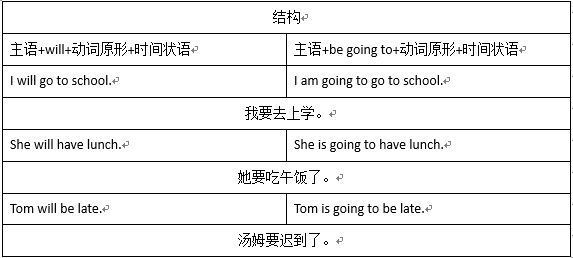免费领取一节
英语试听课
一般将来时主要用来表示将来会发生的动作或状态,常与表将来的时间状语连用。其基本句型结构一般为:主语+will be/do+其他成分。主要用来表将来某一时刻会发生的动作或状态、表将来某一段时间内会发生的动作或状态。
 一、一般将来时主要用来表示将来会发生的动作及打算、计划或准备做某事。例如:
一、一般将来时主要用来表示将来会发生的动作及打算、计划或准备做某事。例如:
 二、标志性词语
1)tomorrow系列
这类时间状语主要有:tomorrow、tomorrow morning/afternoon/evening明天、the day after tomorrow后天等。如:
I’ll see you tomorrow.
我明天来找你。
There is a concert the day after tomorrow, Will you go?
后天有一场演唱会,你去吗?
二、标志性词语
1)tomorrow系列
这类时间状语主要有:tomorrow、tomorrow morning/afternoon/evening明天、the day after tomorrow后天等。如:
I’ll see you tomorrow.
我明天来找你。
There is a concert the day after tomorrow, Will you go?
后天有一场演唱会,你去吗?
2)next系列 这类时间状语主要是指由“next+时间单位”引导的短语: next Wednesday下周三 next week 下周 next month下个月 next year明年 例如: We’re going on a trip to volcano island next month. 我们下个月要去火山岛旅行。 I’m going to Li Yan’s birthday next Wednesday. 下周三要去参加李岩的生日。
3)“in+一段时间+‘s+time”系列 这个短语的意思是“多长时间之后”。需要注意的是:如果一段时间为单数,所有格采用“‘s”的形式;如果一段时间为以s结尾的复数,所有格采用“’”的形式。如: The train will leave in five hours’ time. 火车五小时后出发。 The plane will arrive in one hour’s time. 飞机一小时后到达。
4)…later…以后 ten years later十年后 six weeks later一个半月后 ten days later十天后 例如: I’ll see you in ten years later. 我们相约十年后再相见。 Li Lei’s graduation is in ten days later. 十天后是李磊的毕业典礼。
三、现在进行时表示一般将来时 某些动词如:go/come/leave/start/begin/arrive等,他们的现在进行时可以表示将来时,例如: I am having an English class tonight. 我今晚有英语课。 They are coming to Lucy’s party tomorrow. 他们明天会来露西的派对。